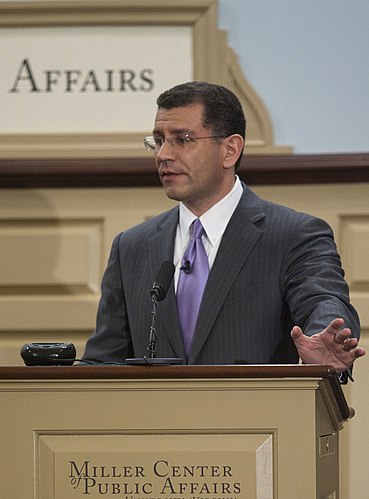1.
Having a good constitution is far more important than having an immediate constitution.
Kenneth M. Pollack
2.
It is unimaginable that the United States would have to contribute hundreds of billions of dollars and highly unlikely that we would have to contribute even tens of billions of dollars.
Kenneth M. Pollack
3.
Our support for the Shah, the CIA coup in 1953 - has become infused into the Iranian political discourse. The regime that came to power in 1979 during the Iranian revolution actually defined itself as anti-American, and that's now a critical ingredient in the Iranian domestic political debate. That really is the source of our problems - the regime in Tehran continues to see itself as opposing the US. In their eyes, everything the US does is directed at them in a very malevolent way, and therefore they have to fight back against it.
Kenneth M. Pollack
4.
More likely, there were probably some real divisions within the Iranian government - some groups wanted to ally with al Qaeda against us, others didn't want to have anything to do with that. So I think that debate resulted in no decision being made for awhile. The problem was they left the al-Qaeda folks in Iran in the hands of their intelligence services and Revolutionary Guard, who didn't really keep an eye on them - and may not have kept an eye on them on purpose.
Kenneth M. Pollack
5.
Iran uses terrorism very instrumentally as an element of foreign policy; they are not just intent on just killing as many people as possible, like al Qaeda. There's no reason to believe that would change.
Kenneth M. Pollack
6.
Once Iran gets nuclear weapons, they may believe that they are no longer vulnerable to either.
Kenneth M. Pollack
7.
The real concern is that Iran would do what Pakistan did. Pakistan wanted nuclear weapons, like Iran, purely for defensive reasons - to defend itself against India. The problem was that once Pakistan acquired the weapons, it allowed the country to be more aggressive. So they stepped up their support for the Kashmiri terrorists, and it led very quickly to the Kargil crisis in 2000, which almost sparked a nuclear war between India and Pakistan.
Kenneth M. Pollack
8.
The basic problem with the Non-Proliferation Treaty is there's no teeth in it, no penalties for countries that don't comply. Worse, as you say, the very naïve structure of the NPT has actually made it helpful for countries who want to acquire nuclear weapons. Iraq, North Korea, Iran, all used the NPT to build up their nuclear programs.
Kenneth M. Pollack
9.
Most Iranians are sick and tired of revolutions. They've had one for the last 25 years, and they don't want another one. Those who've tried to spark another revolution have failed time and again. I don't think there's any evidence that somehow, if the U.S. gave these guys the high sign, it would make regime change somehow more likely. Every time the U.S. has tried to interfere in Iranian affairs to help a particular group of Iranians, it's backfired on us, and hurt the group we tried to help.
Kenneth M. Pollack
10.
The Iranians are very skilled terrorist, and we'd have to expect that they'd hit at us as hard as they could. Especially in Iraq, where they have a great deal of power and influence.
Kenneth M. Pollack
11.
The Europeans are starting to show that they're finally serious about the Iranian nuclear program, and they appear to be willing to use sticks against Iran. So I think it is imperative that the United States sit down with the Europeans and say, "Let's make this very clear to the Iranians. Either they can give up their nuclear program and their support for terrorism, in which case we'll given them all kinds of benefits. Otherwise, we'll join in comprehensive, multilateral sanctions that will cripple their very fragile economy."
Kenneth M. Pollack
12.
The US has just consistently tried to ignore Iran. And this is ironic because the Iranians believe that the United States is as obsessed about them as they are about us.
Kenneth M. Pollack
13.
In the United States, Iran is nothing but a whipping-boy. Few Americans have any real use for Iran. Most of us, what we know and remember about Iran are things like the hostage crisis in 1980, or they think about the Iranian attacks in Lebanon, or on the Khobar Towers. So you don't get a whole lot of political mileage in the United States by going out and advocating better relations with the Iranians.
Kenneth M. Pollack
14.
I think if you could remove all of the baggage - all of the ideology, the history, whatever else - and look in purely geostrategic terms, I think it's hard to figure out why the US and Iran would necessarily be in conflict. In fact during the shah's era, before 1979 - recognizing that there were all kinds of other problems - the US and Iran worked together splendidly at the strategic level.
Kenneth M. Pollack

